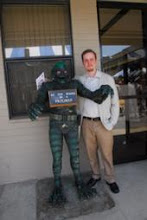Thursday, July 21, 2011
Ego Nonbaptizo Te
Friday, August 13, 2010
An Un-Natural History of the Dead
Read more:http://www.myspace.com/57364862/blog#ixzz0wVFbCI8G
Read more:http://blogs.myspace.com/index.cfm?fuseaction=blog.view&friendId=57364862&blogId=536149984#ixzz0wVFLjVNP
Thursday, August 12, 2010
"Welcome to My Parlor," Said the Spider to the Fly.
Wednesday, August 11, 2010
Defining Freedom-Redux
Memorial Day: On Heroism
Written Memorial Day 2010:
So, it's Memorial Day. And every Memorial Day we here stirring speeches about heroism.
I'm sick to death of stirring speeches about heroism. Not because I'm against heroism. Oh no. I'm a big fan of heroism. I'm just against calling everyone and his Goddamned dog a hero.
We've cheapened the word hero nearly beyond meaning.
It used to mean a literal demi-god; Heracles, Theseus, Perseus, etc- half-man, half-god, in conflict with both, literally saving the world by their own hands. A savior and protector of the world. A being that slew mythic beasts, over-turned wicked despots, founded cities, challenged the gods. A being that literally went to hell and came back again. We used to literally deify them, make our sacrifices to them, worship them, write myths and plays about them.
At a very precise moment in history we gave up on ever meeting a half-god half-man (mainly because of the rise of monotheism). I mean, the last hero like that was literally Jesus Christ.
After that heroes became a bit more human. Less legendary, less mythic. The kind of person that you might meet once in your lifetime.
A person who through extraordinary self-sacrifice and physical and moral bravery served the greater good of all humanity. We gave them honors and accolades, gave them medals and parades, named countries and cities and schools and streets after them.
If you like astronauts, think Neil Armstrong or Yuri Gagarin.
If you're a Communist, visit Lenin's Tomb to see one.
We're talking about someone who pushed the edge of the possible, did the hardest thing you've ever heard of doing, because the hardest thing just happened be the only morally correct choice they could think of. And they did it at tremendous personal cost. Someone who gave us all something to aspire too.
Think Gandhi setting India free or George Washington refusing to be made King of the United States.
Something positively and historically massive.
You don't meet people like that often. You're almost never there to witness the event.
Now it's anyone who displays any measure of self-sacrifice or physical bravery, no matter what the reasoning. Save a kid from a bus, you're a hero; serve a non-combat tour in the military, you're a hero.
I personally know active duty Special Warfare operators, many in fact. Some have Silver Stars, I heard tell that one has a Navy Cross, one was even nominated for the MoH. None of them consider themselves heroes.
And you know what, they're right.
They do their job. And it's a difficult job. And some of them die doing it. But the job needs doing, and they're capable enough and strong enough to do it, when few people are. That's enough.
Being capable of doing a hard job, and being willing to do it, is their only claim to fame.
They understand that a hero is a mythic figure. An example for all of humanity. An example of what we can all aspire too do for the world. That isn't them. And they know it. Because they're honest with themselves and real heroes are too rare to despoil their name.
A hero may be a soldier, but being a soldier has nothing to do with being a hero. A hero may be a patriot, but patriotism is not a heroic virtue. A hero might die so that others may live, but simply dying so that others may live does not make you a hero.
A hero is bigger than any and all of those things.
Memorial Day isn't about remembering heroes. Memorial Day is about remembering that the cost of war, in blood, is never cheap. And that those who die because they were willing to do a hard job, simply because they were strong enough to do it, are worthy of remembrance, too.
E.
